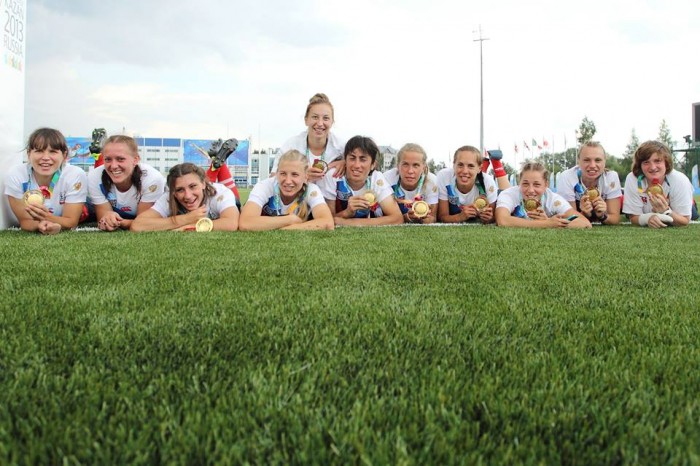Kazan gives us a taste of the future
The World University Games sevens tournaments in Kazan was completed today, with wins for the hosts - Russia - in both events.
Published by John Birch, July 17th, 2013
5 minute read

Until recently the international student rugby has not had the highest of profiles. World University Sevens tournaments have been played bi-annually for over ten years, but rarely have they attracted much attention, mainly because leading the student players tended to choose to play with their national unions (or take a summer break).
However, last year's FISU championship on France was a turning point, with the Great Britain team having the full backing of the RFU for the first time (including the release of all available student players), with similar support to teams being given by other unions.
This has continued this week in Kazan, in Russia, where the women's sevens tournament included a large number of players with international experience, including many who had appeared in the Moscow World Championship only two weeks before.
Obviously the major driver behind this is the addition of rugby sevens to the Olympic programme, with many countries taking every opportunity to try out as many players as possible in international competition.
The Kazan tournament was also interesting as it was played over four days, instead of the usual two - a format that, it has been suggested, will be the blueprint for the Games in Rio .
The ten entrants in the women's event were divided into two pools, with the pool games being played over the first two days. Only the team finishing bottom of the pool was eliminated and in Pool A this was Japan, despite having nearly half of their World Cup team available. Russia - with five World Cup players in the team, plus Navrat Khamidova (sister of Baizat) making her return to international colours - dominated the pool, while Ukraine (with players such as Olga Blanutsa to call on) made up for a disappointing season by finishing as runners-up.
With the competing demands of the England tour of New Zealand, and the U20 Nations Cup, the Great Britain team was not as strong as the one that won the world title in France last year, Sarah McKenna being perhaps the leading name. Most of the teams they faced included were rather more experienced, but despite this they won Pool B with some ease, with China finishing as runners-up and the USA being eliminated.
Day three saw the quarter- and semi-finals, and showed that pool form would be no guide to the rest of the tournament. Russia breezed past Brazil, it is true, but France (with five internationally capped players) pushed Great Britain all the way, Canada blew away China, and Ukraine fell to Italy just two points. Fired up by this the Italians - who had been close to elimination in the pool stages - beat Great Britain 14-5 in the semi-finals, while Russia cruised on with a 31-5 win over Canada.
Finals day today saw France take the Bowl and 7th place with a 21-0 win over Brazil; China came back from their disappointment on Day 3 to beat Ukraine 19-15; Canada recovered from their Russian lesson to take the bronze medal with a 36-0 win over Great Britain; and Russia predictably, perhaps, took gold with a 30-10 win over surprise finalists Italy.
Another great day, then, for Russia (who also won the men's event) - moreover live on national television, giving the game another huge boost. The four day format also seems to work well, especially in a hot climate and as part of a multi-sport event, making its adoption in Rio all the more likely. A number of new players will have had their chance to taste the international game, with some existing players being given new responsibility.Canada and Great Britain's performances were particularly impressive - given their relative inexperience compared to most of the opposition they faced- and indicate a depth of ability that most countries would envy.
On the other hand, results (especially with the performances of teams like Ukraine, who have struggled in the adult game with a similar team) suggests that student rugby - understandably perhaps - lacks the physicality that has recently developed in the adult game (except with the Russian team, obviously!). So how many of these players will make the step-up to the fast-developing adult game and play in Rio in three years time will be interesting to see. However, for now, university rugby has never been so interesting.